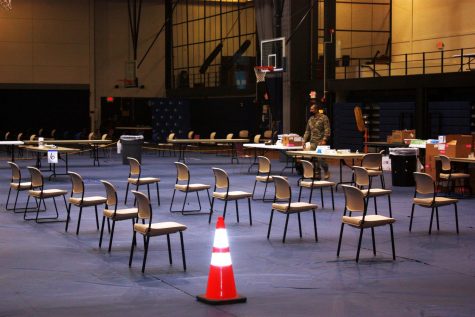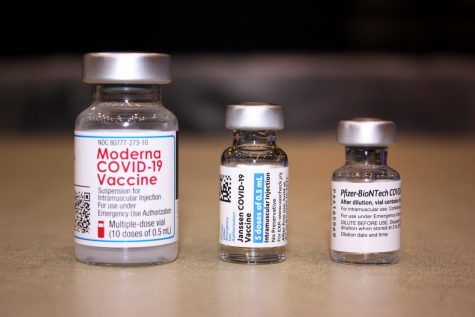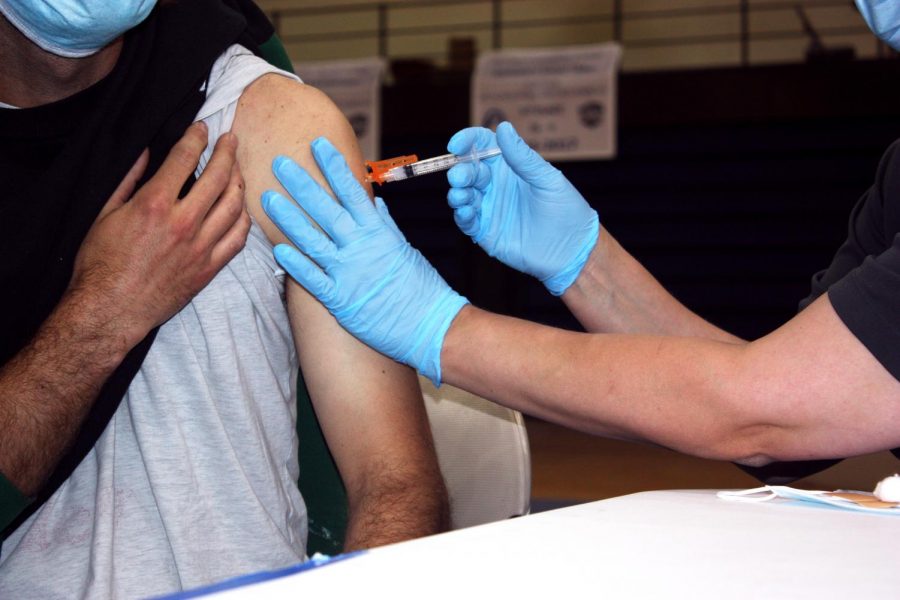Increased COVID-19 vaccine availability leaves some still skeptical of its efficacy and concerned about side effects
Photo by Daniel Bell-Nguyen
Missouri resident receiving a Moderna COVID-19 vaccine at a vaccination site at St. Louis Community College – Forest Park on May 4, 2020.
May 7, 2021
Emily Robbins said she understands why people are hesitant about getting a COVID-19 vaccine as she has reluctant family and friends, but decided she was better off with the shot.
“Do your research and trust the science,” Robbins said as she left her COVID-19 vaccine appointment at the J. Scheidegger Center.
Compass Health Network hosted a COVID-19 vaccination site at Lindenwood’s J. Scheidegger Center for the Arts on April 10.
Julee Mitsler, Lindenwood’s director of communications, said the event offered 3,000 doses of the Moderna vaccine and welcomed walk-ins. Those who were vaccinated will have the opportunity for their second dose on May 8.
Robbins, a stay-at-home mom from Foristell, Missouri, said she has been homeschooling her children since the COVID-19 pandemic began and spent much of her time at home out of caution.
“It’s been over a year since I’ve been in an auditorium,” Robbins said. “It was kind of an emotional experience.”
Robbins said she had no concerns before getting vaccinated and is ready for her life to get back to normal pre-pandemic. She said mistrust of the government and the vaccine development process caused some of her family members to be reluctant to get vaccinated.
Michelle Keller of Ellisville, Missouri, said she had her doubts initially before ultimately deciding to get her COVID-19 vaccine, citing the lack of research on the long-term effects of the vaccine.
“Being able to see my family and being able to get out with friends has outweighed my concerns,” Keller said. “So I went ahead with it today. I’m just ready for the world to get back to normal and to move on with life.”
Joan Hutson, a manufacturing worker from Overland, Missouri, said, “people should just get [vaccinated]. It’s the right thing to do.”
The essential worker said her son is in need of a kidney transplant and spent about two months away from home out of fear of infecting her son.
Hutson said she didn’t hear back from other vaccine providers after seeking multiple appointments. She said she heard about the option for walk-ins at the J. Scheidegger Center vaccination site and is “relieved” she attended.
Hutson said she gets the flu shot regularly, so she finds the COVID-19 vaccine no different.
“I’m on the path to protect myself and my family,” Hutson said.
While the development of the COVID-19 vaccine made the light at the end of the tunnel easier to see for some, the more challenging task is for federal, state, and local governments to convince Americans that getting vaccinated will help bring back some form of normalcy.
Is herd immunity from COVID-19 a reality with vaccine skepticism still running deep among Americans?
Jack Beyer joked, “I’m hoping the line for the next dose isn’t as long as this one,” as he waited about 45 minutes to get his shot.
The 18-year-old high school student from O’Fallon, Missouri, said he was surprised he secured a vaccine appointment because his eligibility group opened up that very same day.
Beyer said his parents, educators, encouraged him to get vaccinated but he was initially on the fence after learning that the Moderna manufacturer never had an FDA drug authorization until now.
Moderna was the second company to receive an FDA emergency-use authorization for a COVID-19 vaccine in the U.S. on Dec. 18, 2020, for adults age 18 and over.
Pfizer and Johnson & Johnson are the only other vaccine manufacturers approved for FDA emergency-use authorization in the U.S. as of now.
According to an ABC News/Washington Post poll, as of April 21, nearly one in every four Americans are “disinclined” to receive any COVID-19 vaccine. The number of disinclined people is down 8% from a similar poll conducted in January.
Among certain demographic groups, vaccine hesitancy can run deeper than in the overall population.
When it comes to the breakdown of political affiliation, the same ABC News/Washington Post poll found of the number of Americans who remain unvaccinated, “63 percent of leaned Democrats are inclined to get vaccinated, vs. 28 percent of leaned Republicans.”
Religion affiliation is another factor with disparities of those who are or intend to get vaccinated and those less inclined.
A March poll conducted by The Associated Press-NORC Center for Public Affairs Research found 40% of white evangelical Protestants wouldn’t get vaccinated, compared with 25% of all Americans.
All 50 states have opened up their eligibility for the COVID-19 vaccine to everyone over the age of 16, but as the supply for the vaccine has increased, the demand has taken a dip.
At a time when nearly 25% of Americans are disinclined to get a COVID-19 vaccine, the Food and Drug Administration and Centers for Disease Control and Prevention recommended a temporary pause of administering the Johnson & Johnson vaccine on April 12.
Out of the nearly 7 million doses administered since mid-April, there were six reported cases of women age 18-48 suffering from blood clots after receiving the Johnson & Johnson vaccine. The FDA said these cases are “extremely rare.”
Johnson & Johnson has since resumed administering their one-dose vaccine on April 23 after getting clearance from the FDA and the CDC. Now the vaccine’s warning label will alert for the risk of blood clots as a potential side effect after the 11-day pause.
At St. Louis Community College – Forest Park, a mass vaccination site has offered the local community COVID-19 vaccines since late March.

Urban League of Metropolitan St. Louis and the Missouri National Guard are now hosting a three-month-long vaccination event including walk-in availability to Missouri residents until the end of June, seven days a week.
Master Sgt. Kirsten Inwood, one of the non-commissioned officers in charge of the vaccination effort, said the demand for vaccinations took a hit over the past few weeks.
“As soon as the Johnson & Johnson scare hit,” Inwood said. “We went from 2,000 [doses] a day to maybe 100 overnight.”
Inwood said the vaccination site now offers all three FDA emergency-use authorized vaccines, but the long lines are no longer present.
“People still aren’t coming,” Inwood said. “My personal opinion, I think the Johnson & Johnson scare really curtailed interest in the vaccines.”
Because of recent lack of demand for COVID-19 vaccines at the St. Louis Community College – Forest Park vaccination site, Inwood said the staff size would be significantly reduced.
“It’s not because of the supply,” Inwood said. “We have the supply and the manpower. We have everything that we need except arms to put the shots in.”
Dr. Shephali Wulff, Infectious Disease Specialist at SSM Health, said the pause of the Johnson & Johnson vaccine should reassure people vaccine safety and adverse reporting systems are working.
“The reporting system was able to detect an adverse event that was as rare as one in 1 million cases,” Wulff said. “The FDA was able to act quickly and pause the Johnson & Johnson vaccine effort to give medical experts time to evaluate the 15 reported cases of cerebral vein thrombosis.”
“Ultimately [the FDA] was not able to find any true causal link between the vaccine and these rare thrombotic events,” Wulff said.
Carrie Whitelaw, a Ballwin, Missouri resident, said she suffered severe side effects, although she didn’t experience blood clots after receiving her Johnson & Johnson vaccine.
“I honestly started to feel worn out and tired within two hours of getting it,” Whitelaw said. “By the third day [of symptoms], I called my best friend in tears.”
Whitelaw said she felt fatigued the day she received her COVID-19 vaccine. Her side effects of a fever, chest and back pains, dizziness, and nausea are why she said she was out of work for seven days.
The 36-year-old bartender said she was persuaded to get her shot after persistent pressure from her coworkers and her family, particularly her mom.
“I personally didn’t want to get it right away,” Whitelaw said. “I only did it because, in a way, I’m not feeling like a leader of my own body. I’m feeling like a follower to what everybody is telling me what I should do.”
Whitelaw said she initially hoped getting vaccinated would give her a peace-of-mind before her upcoming vacation to Florida. She said she is now more hesitant to get another vaccine in the future based on her experience with the Johnson & Johnson vaccine.
“I’ve been a person that’s been kind of weary when it comes to vaccines,” Whitelaw said. “I don’t believe people should not get them. There’s a reason that they’re out there, to keep us away from death and harm. But I think I should’ve waited a lot longer for more facts to come out.”
Those side effects are what worries Victoria Whitfield from Saint Louis. The 64-year-old registered nurse is on the fence about getting a COVID-19 vaccine.
“I’m not saying I won’t ever take it,” Whitfield said. “But I’m currently not taking it. I don’t feel comfortable with it. It’s too early. I am fearful of the unknown side effects that may be triggered.”
Whitfield said it’s not uncommon that she shares these views with some of her work colleagues. She said she used to get the flu shot annually due to asthma but now opts out of the yearly shot after suffering from severe side effects one year.
Whitfield said initially, if she decided to get a COVID-19 vaccine, she would have been more open to getting the Johnson & Johnson vaccine because it’s only a single dose. Although she is not a woman under the age of 50, the news of potential blood clots makes her somewhat uneasy about getting the shot any time soon.
Until Whitfield feels more comfortable receiving a vaccine, she said she would continue being cautious with her social distancing measures and mask-wearing. Whitfield said she saw firsthand how COVID-19 caused illness and death among her friends and community.
As of May 3, the CDC reported that nearly 150 million Americans received at least one dose of a COVID-19 vaccine, making over 30% of the American population fully vaccinated.
“Herd immunity occurs when a large portion of a community becomes immune to a disease, making the spread of disease from person to person unlikely,” according to the Mayo Clinic.
Many medical and disease experts agree that reaching a large majority of a herd immunity threshold will be key to getting American life as close to back-to-normal as possible pre-pandemic.
Dr. Anthony Fauci, the U.S. National Institute of Allergy and Infectious Diseases director, said herd immunity could be achieved by reaching up to 85% of vaccinated Americans in a CNBC News interview.
Dr. Wulff of SSM Health said some of the most common misconceptions from people on the fence include: the COVID-19 vaccine will affect fertility, alter one’s DNA, or allow the federal government to implant a tracking microchip in those who choose to receive the shot.
“The COVID-19 vaccines are safe and incredibly effective in preventing severe illness, hospitalization, and death from COVID-19 disease,” Wulff said. “Nearly 100% effective.”

As of April 29, Wulff said SSM Health administered 150,000 doses of the Pfizer vaccine across the Saint Louis metropolitan area.
She said SSM Health has “multi-lingual education efforts on social media and news outlets, through faith leaders and community leaders” to inform those considering a COVID-19 vaccine.
Wulff also said SSM Health provides vaccines at home through mobile clinics and is “partnering with Affinia Health to provide vaccine to communities that have difficulty with transportation.”








